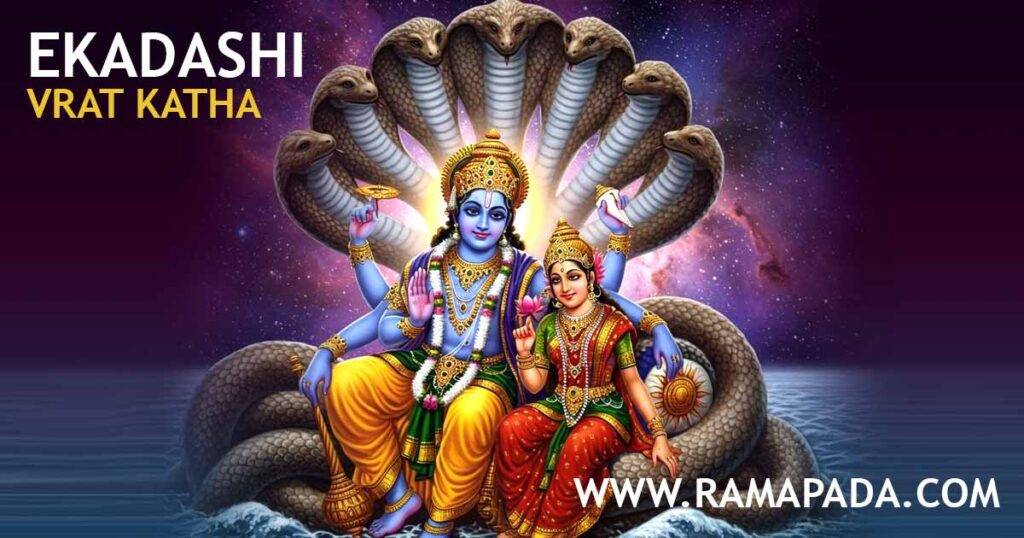Ekadashi, the eleventh lunar day of each fortnight in the Hindu calendar, holds profound spiritual significance. Devotees observe this vrat (fast) twice a month—during Shukla Paksha and Krishna Paksha—to honor Lord Vishnu, the preserver of the universe. Each Ekadashi brings forth a unique story, or vrat katha, that reveals the power of devotion and celebrates the triumph of dharma. Ekadashi Vrat Katha echoes the power of devotion, revealing how dharma prevails through divine grace and spiritual discipline.
Spiritual Significance of Ekadashi
- Devotees regard Ekadashi as the most auspicious day for spiritual cleansing and forging a divine connection.
- Fasting on this day is believed to destroy sins, grant moksha (liberation), and bring peace and prosperity.
- Devotees abstain from grains, pulses, and certain vegetables, choosing instead to consume fruits, milk, and nuts—or observe a complete fast.
Mantra for Ekadashi Vrat Katha
- उत्तिष्ठोत्तिष्ठ गोविन्द त्यज निद्रां जगत्पते।
त्वयि सुप्ते जगन्नाथ जगत् सुप्तं भवेदिदम्॥ - उत्थिते चेष्टते सर्वमुत्तिष्ठोत्तिष्ठ माधव।
गता मेघा वियच्चैव निर्मलं निर्मलादिशः॥
Popular Ekadashi Vrat Katha
Each Ekadashi has its own legend, often narrated during the vrat to inspire devotion. Here are a few notable ones:
| Ekadashi | Month | Vrat Katha Summary |
| Utpanna Ekadashi | Margashirsha Krishna | Goddess Ekadashi emerges from Lord Vishnu to defeat the demon Mura. |
| Mokshada Ekadashi | Margashirsha Shukla | King Vaikhanasa attains liberation after hearing the Bhagavad Gita from Sage Parvata. |
| Putrada Ekadashi | Paush Shukla | King Suketuman is blessed with a son after observing the fast. |
| Devshayani Ekadashi | Ashadha Shukla | Marks the beginning of Chaturmas. Lord Vishnu enters cosmic sleep in Kshirasagar. |
| Indira Ekadashi | Ashwin Krishna | King Indrasen liberates his father from Yamaloka by observing the vrat. |
You can explore a full collection of these stories on Drik Panchang’s Ekadashi Vrat Katha page.
Rituals and Observance
- Preparation begins on Dashami, the day before Ekadashi, with a light meal and spiritual focus.
- On Ekadashi, devotees wake early, bathe, and perform puja to Lord Vishnu with tulsi leaves, flowers, and incense.
- Fasting styles vary: Nirjala (without water), Phalahar (fruits only), or Satvik meals once a day.
- Devotees break their fast on Dwadashi, the following day, during the Parana period after sunrise.
Why the Vrat Katha Matters
The vrat katha is not just a story—it’s a moral compass, guiding devotees through trials, temptations, and the rewards of faith. Listening to or reading the katha during Ekadashi enhances the spiritual merit of the fast, making it four times more fruitful.

